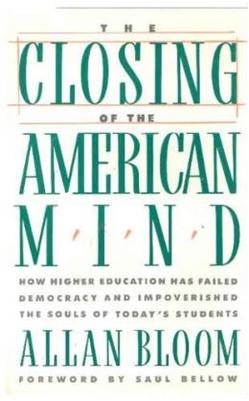The Closing of the American Mind by Allan Bloom, ISBN-13: 978-0671479909
[PDF eBook eTextbook]
- Publisher: Simon & Schuster (April 1, 1987)
- Language: English
- 392 pages
- ISBN-10: 0671479903
- ISBN-13: 978-0671479909
The Closing of the American Mind: How Higher Education Has Failed Democracy and Impoverished the Souls of Today’s Students is a 1987 book by the philosopher Allan Bloom, in which the author criticizes the “openness” of relativism, in academia and society in general, as leading paradoxically to the great “closing” referenced in the book’s title. In Bloom’s view, “openness” undermines critical thinking and eliminates the “point of view” that defines cultures. The book became an unexpected best seller, eventually selling close to half a million copies in hardback.
Bloom critiques the contemporary American university and how he sees it is failing its students, criticizing modern movements in philosophy and the humanities. Throughout the book, he attacks the “moral relativism” that he claims has taken over American universities for the barrier it constructs to the notions of truth, critical thinking, and genuine knowledge. Bloom claims that students in the 1980s have prioritized the immediate, blind relegation of prejudice as inferiority of thought, and therefore have “closed” their minds, as the title suggests, to asking the right questions, so that prejudice may be eradicated through logic and critical thinking, as opposed to empty, baseless instinct. Bloom writes, “Prejudices, strong prejudices, are visions about the way things are. … Error is indeed our enemy, but it alone points to the truth and therefore deserves our respectful treatment. The mind that has no prejudices at the outset is empty.”
The jurist Richard Posner compared Bloom’s book to Paglia’s Sexual Personae (1990), finding both books to be examples of “difficult academic works that mysteriously strike a chord with a broad public.” Thus, since publication, The Closing of the American Mind, fueled many impassioned debates about the state of culture in America. In retaliation the American historian Lawrence W. Levine wrote The Opening of the American Mind. According to The New York Times’ Edward Rothstein, Levine’s work, published ten full years later, still found it relevant to “praise what Bloom condemned and condemn what he praised.” But where, initially, political conservatives espoused Bloom’s theories and liberals disavowed it, things seemed to be changing. According to Rothstein, ten years later, in 1997, the lines between supporter and opponent were no longer so clear. He found that, “many conservatives have no problem with diversity if it is accompanied by rigor; many liberals have no problem with rigor if it is accompanied by diversity. And the view that something is amiss in contemporary culture is becoming increasingly widespread.” Ultimately, Rothstein concludes, Bloom’s work has very little to do “with current political demarcations.”
Jerry Aaron Snyder of The New Republic, however, argues that the culture wars, which Bloom’s work clearly helped spark a conversation about, will consistently be relevant. While it may be argued that The Closing of the American Mind may not resign itself to a political party, this does not preclude it from the impact it had on the culture wars, and how those culture wars shape life today. Snyder argues that books like Bloom’s have inspired further conversations and controversies alike, such as controversy surrounding how history is taught in high schools, or the effectiveness of affirmative action or identity politics. According to Snyder, the discussions spawned by the initial culture wars in the 1980s because of books like Bloom’s, “‘the soul of America’ is a bottomless well. For better or worse, it will never run dry.”
What makes us different?
• Instant Download
• Always Competitive Pricing
• 100% Privacy
• FREE Sample Available
• 24-7 LIVE Customer Support






Reviews
There are no reviews yet.